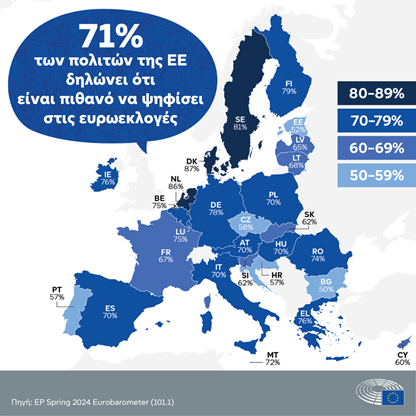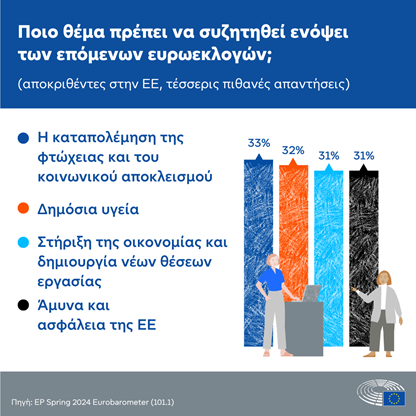The European Parliament’s latest Eurobarometer ahead of the June elections captures citizens’ vigilance and concern about the current geopolitical context
A positive upward trend in key electoral indicators with just weeks to go until EU citizens head to the polls on 6-9 June highlights the latest Eurobarometer of the European Parliament before the European elections.
Interest in elections, awareness of when they will be held, and the likelihood of participation are all on the rise since the most recent survey in fall 2023. The increases are even more impressive compared to the spring 2019 survey, i.e. three months before the previous European elections.
Now, 60% of Europeans say they are interested in voting in June – up 3 percentage points compared to autumn 2023 and 11 compared to February/March 2019. 71% say they are likely to vote, rating the possibility at 7 to 10 (on a scale of 1 very unlikely – 10 very likely), an indicator that shows an increase of three percentage points in the last six months and 10 percentage points compared to 2019. The findings suggest that EU citizens are very aware well the importance of the election in the current geopolitical context, with eight in ten (81%) respondents agreeing that this makes voting even more important. Large majorities in all member states agree with this statement.
In Greece, 56% of respondents said they are interested in voting in June, while 76% say they are likely to vote. At the same time, 78% of Greek citizens seem to recognize the high importance of participating in the upcoming European elections due to the current geopolitical situation.
The President of the European Parliament Roberta Metsola, commenting on the results of the survey, said: “Europeans know that the stakes at the polls are high, but also that the existing geopolitical context makes voting even more important. I call on our citizens to vote in the upcoming European elections, to strengthen European democracy and shape the future of Europe.”
With the current parliamentary term coming to an end, 81% of EU citizens (77% in Greece) have a positive or neutral view of the European Parliament, while only 18% say it is negative. Furthermore, the majority in the EU (56%) would like the EP to play a more important role, while only 28% would like to see the opposite and 10% to keep its role as it is now. In Greece, 73% say they would like a stronger role for Parliament.
President Metsola added: “Parliament and the European Union in recent years have produced work to an unprecedented degree. We have faced extraordinary and difficult circumstances, but we have become even stronger and united through them. The Parliament has been and will continue to be the voice and defender of citizens in the EU.”
European citizens would like to see fighting poverty and social exclusion (33%) as well as supporting public health (32%) at the center of the election campaign. Supporting the economy and creating new jobs, as well as the defense and security of the EU are in third place with the same percentage (31%). The importance citizens attach to the EU’s defense and security has increased during the current parliamentary term, mainly due to Russia’s war of aggression against Ukraine. It is now reported as the first pre-election priority (either alone or tied) in nine countries, with the highest results in Denmark (56%), Finland (55%) and Lithuania (53%).
More than 50% of respondents in Greece would like the political proposals of the pre-election campaign to address public health (56%), supporting the economy and creating new jobs (55%) and combating poverty and social exclusion (55%).
Looking ahead, EU citizens put defense and security (37%) as the top priorities for strengthening the EU’s position on the world stage, followed by energy issues on the one hand and food security and agriculture on the other (and both categories with a percentage of 30″). Respondents in Greece rank strengthening EU competitiveness, economy and industry (38%), food security and agriculture (36%) and energy (35%) as priorities in this context.
Although four in ten citizens say that the EU’s role has become more important in recent years, 35% believe that it has remained stable and 22% that it has weakened. At national level, relative majorities in 15 countries believe that the EU’s role in the world has strengthened over the years, with figures reaching 67% in Sweden, 63% in Portugal and 60% in Denmark. At the other end of the spectrum, Slovenian and Czech citizens are more likely to say that the role of the EU has become less important (32% and 30%, respectively).
Around 4 out of 10 respondents in Greece consider either that the European Union’s contribution to the global political scene has become more important (38%) or that it has remained stable compared to the past (43%), while around 2 out of 10 consider that it has become less important (18%).
Almost three quarters of citizens (73%, +3 percentage points compared to autumn 2023) claim that EU actions have an impact on their daily lives, including a fifth (20%) who say they have a very high impact . Furthermore, a large majority of Europeans agree that their country, overall, benefits from EU membership (71%). These results are stable compared to autumn 2023 and remain high across the EU. For Greece, the percentage of citizens who consider EU actions to have an impact on their daily lives is 83%, while 70% of respondents claims that the country has benefited overall from joining the EU.
Source: Skai
I have worked in the news industry for over 10 years. I have been an author at News Bulletin 247 for the past 2 years. I mostly cover politics news. I am a highly experienced and respected journalist. I have won numerous awards for my work.












